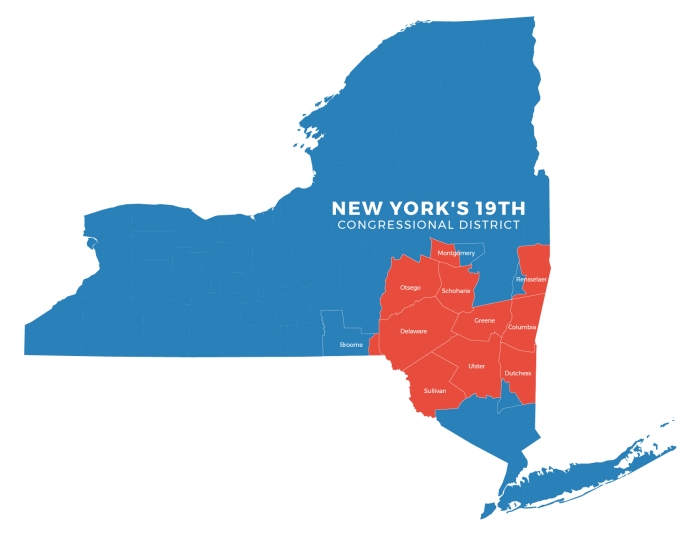 About two-thirds of democratic Congressional candidate Erin Collier’s Twitter followers appear to be fake.
About two-thirds of democratic Congressional candidate Erin Collier’s Twitter followers appear to be fake.
However, there is no evidence the followers’ profiles originate from within the Collier campaign, or that Collier is in any way complicit.
Collier is one of seven candidates facing off in next month’s democratic Congressional primary to see who will challenge Republican John Faso in November. Faso’s district, NY-19, which encompasses the northern Hudson Valley, Catskills and areas east and west of Albany, is considered one of the most competitive in the nation.
Collier’s account has many credible followers, including local journalists and some of the other NY-19 candidates. Then there are the others.
Thousands of Collier’s followers have no bio, have no followers themselves, and have never tweeted anything. Almost all of these followers do not have images of real people in their profile pictures, but instead, Japanese anime characters, or American cartoon characters. There are at least 11 accounts with Homer Simpson as their profile picture; some of the accounts have the same Homer picture.
These profiles follow accounts other than Collier’s, though they do not seem to interact with them. Some of the profiles follow the same obscure accounts.
One profile, @CharmonHaakins1, follows Twitter accounts in English, Russian, Spanish, Arabic, Turkish, French, Mandarin Chinese, Maylay, and Naga tongues (languages spoken in eastern India).
A random sampling of 100 of these profiles shows every single one was created in the last six weeks — since the beginning of April.
A cached version of Collier’s Twitter followers can be viewed here.
Running Collier’s Twitter profile through the website Twitter Audit, which was created to detect the legitimacy of Twitter followers, shows that 3,693 of Colliers’ 5,376 followers are “Fake” as of noon today (May 10th) — 69 percent.
As comparison, Twitter Audit states less than 2 percent of the six other democratic primary candidates’ followers are “Fake” when their profiles are examined.
Two people working in the social media field reviewed Collier’s account and questioned the credibility of the followers, but cautioned that there was no indication the Collier campaign had created the profiles.
Audrey Brand, who works with social media at a B2B manufacturing company based out of Ulster County, noted the profiles’ lack of tweets, followers, non-cartoon profile pictures, and that the accounts were unverified by Twitter, but questioned whether it was right to call them “fake,” stating they were “not as credible.”
“I would say it seems definitely questionable” a single person is behind each profile, she said.
Alex Panagiotopoulos, a principal at Kingston Creative, a local digital marketing firm, called the followers “blatantly fake,” but cautioned about the origins of the profiles.
(Full Disclosure: Kingston Creative was paid to produce the logo of one of the other NY-19 democratic Congressional candidates, Jeff Beals, and launch his website in the early days of the campaign. The company now does volunteer work with another NY-19 candidate, Dave Clegg).
“We have no idea who bought the followers, or if it could be someone that is a bad actor,” Panagiotopoulos said.
“You could go on, say, Fiverr, or Upwork, and you can pay someone five, 10 or 20 dollars, and they’ll promise you 1,000 Twitter followers really quickly,” he continued. “So, if someone was looking to kind of do a false flag attack on Erin Collier, they could do that.”
A “false flag” attack is a destructive or unethical action that is fabricated by an entity so the action looks like it is the fault of the entity’s opponent in order to discredit the opponent.
Going through the profiles, Panagiotopoulos noted the followers in question did not Retweet or otherwise engage with Collier’s posts, which would have boosted the candidate’s visibility on the social media site.
The profiles would therefore not be aiding the candidate’s cause in this way, but higher numbers of followers increase what Panagiotopoulos calls the “trust signal” — its perceived legitimacy.
“So, if I’m learning about Erin Collier for the first time…and I’ve never heard of her before, but I want to support a progressive candidate in a district that I’ve never heard of before, and I click on her profile, and I see a blue checkmark (Twitter’s “verified” icon), and a high follower count, I might just throw 20 dollars at the campaign,” he hypothesized.
The Collier campaign declined comment.
Twitter “strictly prohibits” buying fake followers, according to site’s user agreement.
“When you purchase followers, Retweets and likes, you are often purchasing bot (fake) or hacked accounts. Any account caught participating in this behavior will be in violation of the Twitter Rules and may be suspended,” according to the site.


